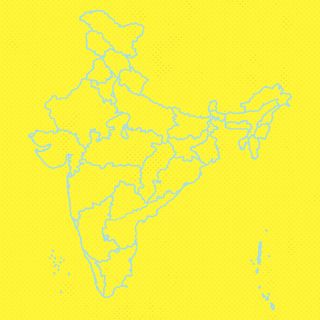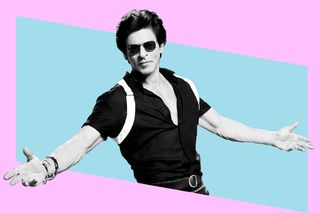
Shah Rukh Has Spoken
‘Jawan’ says everything we’ve wanted Shah Rukh to say — in a climate where it’s never been more hostile to say it.

‘Jawan’ is not a controversial film. It’s a film with heart. Except, having heart is now antithetical to the cinematic landscape in India today.
In Shah Rukh Khan’s second release of the year, he’s gone further than he ever has in delivering a message. It’s cheesy, it’s sappy, it’s preachy — but it doesn’t matter. What matters is that he said it. Shah Rukh, the Bollywood star persecuted for remaining impassive to the ruling party’s attempts to bulldoze Bollywood, is the text. Towards the end of Jawan, there’s a rousing monologue which makes you forget Azad, the character who is speaking it. Anybody bearing witness to it knows it’s Shah Rukh who’s speaking. And he’s looking right at us.
What he says isn’t pathbreaking or even very new. He shows you the power of your index finger, signifying your vote. He beseeches you to ask questions of your government. It’s a rousing script: not because of the words, which are familiar and passé, but who is saying them. When they ask for your vote, ask what they will do for you for the next five years, he says. It’s prescient, and hardly coincidental as a statement on the eve of the next general election.
Since 2014, a lot has changed in cinema — and Bollywood especially. The first jolt to any public figure’s image was when, in 2015, Shah Rukh Khan was relentlessly hounded for alluding to growing intolerance in the country. He’s been silent ever since, prompting calls from progressive corners to say something more. It came to a head in 2019, during the anti-CAA-NRC protests: Shah Rukh remained quiet, much to the chagrin of progressives who were out on the streets. A recent cover story in The Caravan, however, called it his “silent rebellion.” Not everyone bought it: how much do we excuse celebrities, especially living legends like Shah Rukh Khan, for their reticence to do anything openly?
Arguably, Jawan is his answer. When he finally speaks, it’s through the medium he knows best: cinema.
Over the decades, Shah Rukh has evolved into an icon with whom to search for answers to questions that aren’t even about him. His persona has grown to be a lens with which to view the country, its anxieties, its joys, and its many sadnesses. Author and economist Shrayana Bhattacharya uses his fandom as methodology to look at Indian women’s economic agency. Other papers have viewed him as a prism to analyze the Indian middle class’s anxieties in a neoliberal economy.
His previous blockbuster this year, Pathaan, wasn’t quite overt in its politics. It left viewers searching for clues and easter eggs for ways in which it subverted the ruling politics of the country. In a sense, Shah Rukh’s comeback film after half a decade was the lens with which many Indians searched for something else: hope, solidarity, nostalgia, and reclamation of joy in the movies, without having to declare a side with the government or with Shah Rukh on opposite sides. Not everyone — myself included — was convinced about the attempt. It began to feel like more of the same: liberals projecting their own desires onto a man who has long fallen silent, even if it’s in self-preservation. Many began to stop expecting political statements out of movie stars: the time for that is long gone.
You don’t have to do a lot of searching in Jawan, however, to understand its politics. He speaks it, loud and clear.
It’s also a departure from his own iconography. Shah Rukh is known for embodying fragility, as one BBC article put it. In Jawan, he’s infallible, rock-solid, much like he was in Pathaan — with the added trait of also being clear-eyed and unwavering about what to say.
It’s worth questioning whether Jawan could have achieved what it did without its distinctly Tamil, massy flavor. This doesn’t feel like a Bollywood film: it’s a Tamil film which happens to star Shah Rukh Khan. Watching it from Chennai drove the point further home: everyone, from Nayanthara to Vijay Sethupathi to Deepika Padukone, got the full feet-to-head intro shot that’s a signature of Tamil and Telugu films. Everyone is a superstar in this film. It isn’t just Shah Rukh’s film — but there are moments when it does feel like Shah Rukh’s definitive statement.
Stories about fighting corruption, representing the small guy, sticking it to the man, and forcing the government to be accountable aren’t new to Kollywood or Tollywood. In the recent past, however, it is very new — and consequently, very unexpected — for Bollywood. In a cultural milieu saturated with The Kashmir Files, Kerala Story, Prime Minister Modi, Adipurush, and more, there’s never been a more bleak moment in time where Hindi cinema was so constrained by politics. Not even during the Emergency.
Related on The Swaddle:
Bollywood’s Soul Resided in Its Love Stories. Are They Disappearing?
It makes sense, then, that Jawan isn’t just a Hindi film. It’s the only way a film today can tackle farmer suicides, privatization, money laundering by powerful businessmen, inadequate oxygen cylinders (and equipment) in hospitals, and patriotism in the same movie: join forces with the industries that have continued to do it, even if it’s now against the grain. It’s hard not to read these as direct critiques of the last nine years: the farmers’ laws, the accelerated privatization, the Covid19 mismanagement, and the constant tests — and punishments — of a citizen’s patriotism. It’s arguably a testament to the power of collaborating equally with Kollywood, an industry which hasn’t yet capitulated to Hindu nationalism, to show that dissent is patriotic, and accountability isn’t antinational. Shah Rukh’s journey in the film begins from within the system, then migrates outside of it, but through it all, he claims the mantle of jawan, or soldier.
It’s a collaboration that’s paid off: viral videos online show Shah Rukh Khan getting the South Indian star’s welcome: with many queuing up to buy tickets at 2am, pouring milk over a huge cutout, and bursting crackers in allegiance to him. If Shah Rukh’s influence in North India was ever in doubt, he simply found a foothold elsewhere. And in doing so, he reclaimed his identity as Indian — and affirmed what he wants it to mean. It doesn’t mean declaring allegiance to the country. It means having the courage to speak up when it’s going wrong. The Southern welcome also marks another paradigm shift: the decline of Hindi cinema. Its biggest, most beloved star, unsupported and alone in a hostile climate, has just crossed over.
You don’t have to be nationalistic, or even patriotic, to appreciate what’s happened here. It’s a difficult thing to simply ask for accountability. That someone of his stature did it means something. That someone who has been compared to a terrorist by the ruling government’s leaders is the only one of few in an industry full of others who have turned belly-up in the face of political pressure, means even more.
Jawan isn’t revolutionary for anything radical, and isn’t even an actual revolution in any sense; it’s just revolutionary for restoring normalcy, and pulling the Overton window back a little from its stiff vigil on the right. It’s righteous, courageous, and heroic, it seems to say, to do something very simple: expect better, and ask questions. Perhaps the most quintessentially Shah Rukh thing about this film is that it’s bigger than Shah Rukh, even as he remains larger than life. As Paromita Vohra put it: “Shah Rukh has denied categorisation, remaining markedly Muslim and frankly Indian, commercial and refined, earthy and urbane. In his double meanings he conveys that these identities are not so much one and the same as porous, overlapping, adjacent and fluid, meeting each other often in a place of mehman nawazi, of love, of exchange.”
A research paper asked: can the celebrity speak? It looked at Shah Rukh as the “transcultural symbol of Liberal Islam.” It’s unclear whether so far, we expected too much or too little of him. Finally, our expectations are in equilibrium, because now, finally, he’s spoken the way he was always meant to: with heart.
Politics notwithstanding, it’s also a great film, eliciting whistling and cheering at every turn. Watch it.
Rohitha Naraharisetty is a Senior Associate Editor at The Swaddle. She writes about the intersection of gender, caste, social movements, and pop culture. She can be found on Instagram at @rohitha_97 or on Twitter at @romimacaronii.
Related


A Housekeeper Was Accused of Murdering a Woman Staying Alone in an Andheri Flat
